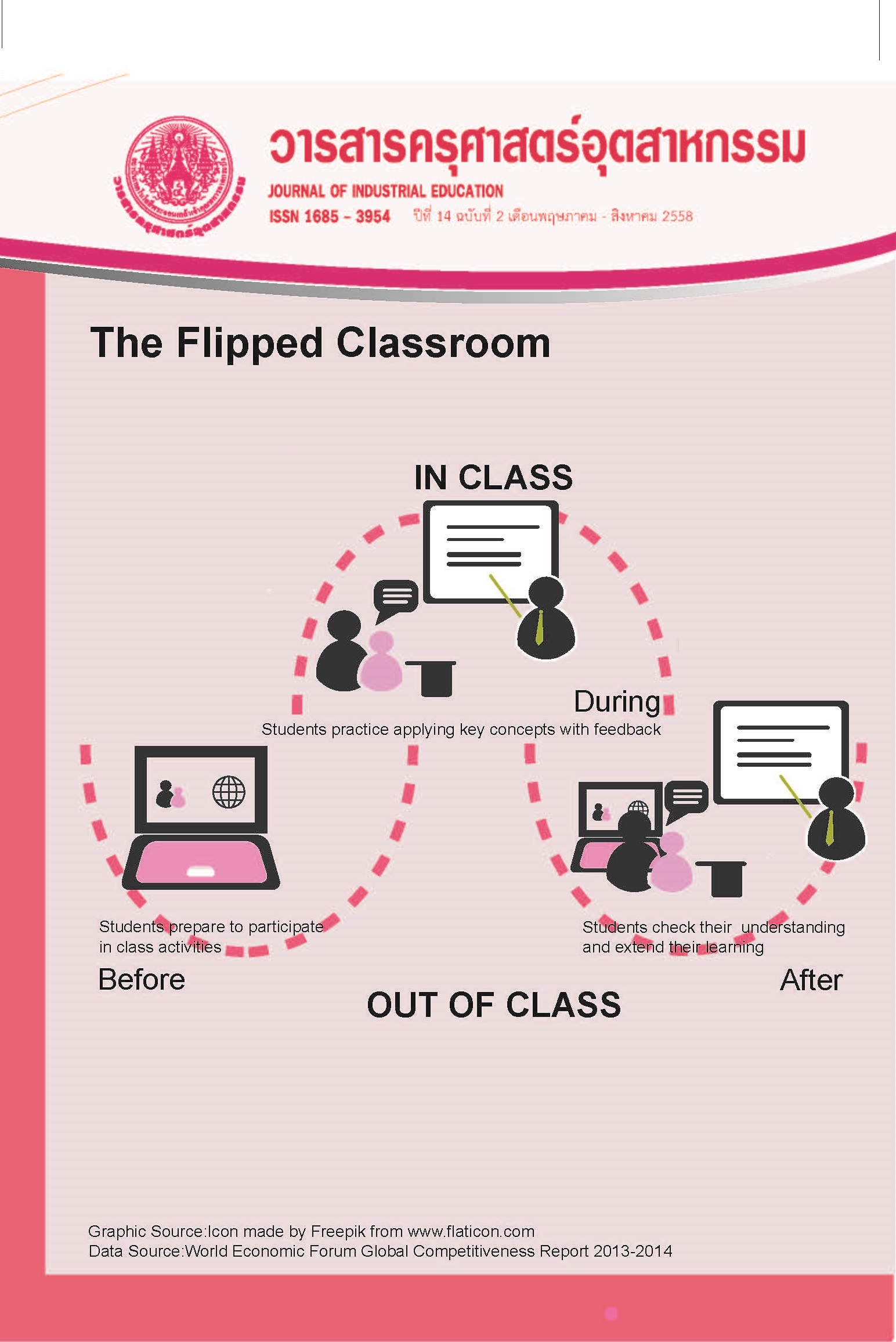The Causal Factors Affecting Life Skills of Mathayomsuksa 3 Students in Secondary Education Service Area Office 2
Main Article Content
Abstract
The objectives of this study were 1) to find the life skills levels of Authoritative Parenting Style , Self - concept, Attitude toward Learning and Achievement Motive of Mathayomsuksa 3 students in Secondary Education Service Area Office 2. 2) to develop and examine the consistency of a causal factors affecting life skills of Mathayomsuksa 3 students, developed by empirical data and 3) to study the influence of Authoritative Parenting Style , Self - concept, Attitude toward Learning and Achievement Motive to the life skills of Mathayomsuksa 3 students in Secondary Education Service Area Office 2. The sample was consisted of 910 students from 23,920 Mathayomsuksa 3 students, first semester of academic year 2014 in Secondary Education Service Area Office 2 using multi- stage random sampling .The study was consisted of 4 endogenous latent variables and 1 exogenous latent variables and of 24 observed variables. The research instrument was an appropriate measurement of the casual factors affecting life skills. The reliability level is between .917 - .977. Structural equation modeling was used for data analysis. The results of the study were as follows :
1) Causal factors affecting life skills of Mathayomsuksa 3 students, Secondary Education Service Area Office 2 were as follows : Life skills at a high level ( = 2.899, S.D.= .680), Authoritative Parenting Style at a high level (
= 3.643, S.D.= .691), Self – concept at a high level (
= 3.669, S.D.= .566), Attitude toward Learning at a high level (
= 3.542, S.D.= .838) and Achievement Motive at a high level (
= 3.669, S.D.= .621).
2) The causal model fit with the empirical data affecting life skills of Mathayomsuksa 3 students Secondary Education Service Area Office 2, the results indicated that the adjusted model was consistent with empirical data. Goodness of fit indicators included a Chi-square test of goodness of fit =(c2 = 211.968, X2/df=1.743, df =122, p =.192, RMSEA= .024, RMR= .003, GFI= .987, AGFI = .968, CFI = .998,TLI =.996) in that way all variables showed by the empirical data and model accounted for 84 percent of variance on life skills.
3) The four latent variables having a statistically significant directly effecting on life skills were 1) Authoritative Parenting Style (β = .249) 2) Self – concept (β = .179) 3) Attitude toward Learning (β = .288) and 4) Achievement Motive (β = .272). The three latent variables that had an indirect impact on life skills were 1) Authoritative Parenting Style (β= .552) affecting through Self – concept, Attitude toward Learning and Achievement Motive 2) Self – concept (β= .104) affecting through Achievement Motive and 3) Attitude toward Learning (β = .143) affecting through Achievement Motive . The variable with statistically significant effecting was Authoritative Parenting Style (β = .801).
Article Details
"The opinions and contents including the words in papers are responsibility by the authors."
"ข้อคิดเห็น เนื้อหา รวมทั้งการใช้ภาษาในบทความถือเป็นความรับผิดชอบของผู้เขียน"
References
[2] กรมสุขภาพจิต. 2541. คู่มือดูแลสุขภาพจิตเด็กวัยเรียน. กรุงเทพฯ : โรงพิมพ์คุรุสภาลาดพร้าว.
[3] สายสมร ยุวนิมิ. 2545. ระบบดูแลช่วยเหลือ นักเรียน: แนวทางหนึ่งในการปฏิรูปการเรียนรู้ของกรมสามัญศึกษา. วารสาร วิชาการ,5(5), น. 71-74.
[4] สำนักงานเขตพื้นที่การศึกษามัธยมศึกษาเขต 2. 2555. ข้อมูลสารสนเทศ สำนักงานเขตพื้นที่การศึกษามัธยมศึกษา เขต 2. กรุงเทพฯ : กลุ่มงาน ข้อมูลสารเทศ กลุ่มนโยบายและแผน
[5] สุมาลี เทวฤทธิ์. 2553 . ปัจจัยเชิงสาเหตุที่มีอิทธิพลต่อทักษะชีวิตของนักเรียนชั้นมัธยมศึกษาปีที่ 5 จังหวัดกาฬสินธุ์. การศึกษา มหาบัณฑิต สาขาวิชาการวิจัยการศึกษา มหาวิทยาลัยมหาสารคาม.
[6] วันดี วิถี. 2554. ปัจจัยที่มีอิทธิพลต่อทักษะชีวิต ของนักเรียนชั้นมัธยมศึกษาปีที่ 5 จังหวัดศรีสะเกษ การวิเคราะห์กลุ่มพหุ. การศึกษามหาบัณฑิต สาขาวิชาการวิจัยการศึกษา มหาวิทยาลัยมหาสารคาม.
[7] วนาพร สาชนะ. 2554. การวิเคราะห์จำแนกกลุ่มปัจจัยที่มีอิทธิพลต่อทักษะชีวิต ของนักเรียนช่วงชั้นที่ 3 ในจังหวัดอุดรธานี. การศึกษามหาบัณฑิต สาขาการวิจัยการศึกษา มหาวิทยาลัย มหาสารคาม.
[8] อรวรรณ เจาะประโคน. 2551. ปัจจัยเชิงสาเหตุที่มี อิทธิพลต่อทักษะชีวิตของนักเรียนระดับ ช่วงชั้นที่ 3 สํานักงานเขตพื้นที่การศึกษาศรีสะเกษ เขต 3. การศึกษามหาบัณฑิต สาขาวิชาการวิจัย. มหาวิทยาลัยสารคาม
[9] วลีรัตน์ จันทร์เลาะ. 2552. ปัจจัยเชิงสาเหตุที่มีอิทธิพลต่อความสามารถในการเผชิญและฝ่าฟันอุปสรรคของนักเรียนชั้น มัธยมศึกษาปีที่ 3 จังหวัดศรีสะเกษ. การศึกษามหาบัณฑิต สาขาวิชาการวิจัยการศึกษา มหาวิทยาลัยมหาสารคาม.
[10] รักยิ่ง หงส์ประสิทธิ์. 2554. ปัจจัยเชิงสาเหตุที่มีอิทธิพลต่อการคิดขั้นสูง ของนักเรียน ชั้นมัธยม ศึกษาปีที่ 3 จังหวัดอุดรธานี. การศึกษามหาบัณฑิต สาขาการวิจัยการศึกษา คณะศึกษาศาสตร์ มหาวิทยาลัยมหาสารคาม.
[11] นงลักษณ์ วิรัชชัย. 2548. แนวโน้มการวิจัยในยุคสังคมความรู้. วารสารบริหารการศึกษา, 1(2), น. 9-18.
[12] นภเนตร ธรรมบวร. 2545. การพัฒนากระบวนการคิดในเด็กปฐมวัย. กรุงเทพฯ: สำนักพิมพ์แห่งจุฬาลงกรณ์มหาวิทยาลัย.
[13] พรสวรรค์ วิรัตน์เศรษฐสิน พรรณี ลีกิจวัฒนะ และไพฑูรย์ พิมดี. 2553. ตัวแปรที่ส่งผลต่อพฤติกรรมการติดอินเทอร์เน็ตของนักเรียนช่วงชั้นที่ 3 โรงเรียนสังกัดสํานักงานคณะกรรมการการ ศึกษาขั้นพื้นฐาน เขตพื้นที่การศึกษากรุงเทพมหานครเขต 1. วารสารครุศาสตร์อุตสาหกรรม, 9 (2), น. 156-164.

